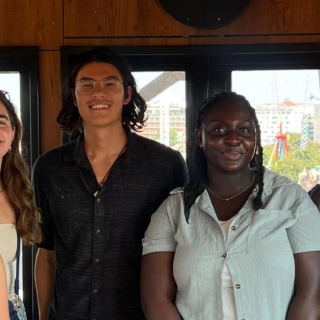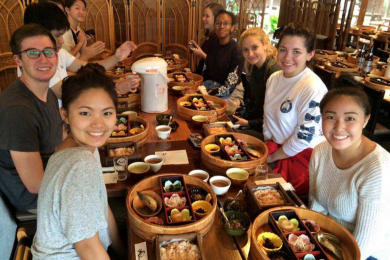Making a financial plan now for your study abroad experience will help you live in the moment while you're abroad. Explore these resources, and learn about how much study abroad will cost you. Take the time to research your expenses; your resources, like scholarships and financial aid; and tips on how to save money before you go and once you're abroad. Check out the Study Abroad Expense Worksheet, and read more below for tools and tips to help you out!
7 Costs to Plan for in Your Study Abroad Budget

After You Arrive

Avoid Tourist Traps
Eat like locals where the locals eat! Sometimes venturing off the beaten path and asking other students or IES Abroad staff for tips on good places to grab a bite can really pay off.

Take Advantage of Student Discounts
Many countries have great student discounts for museums, cinemas, theaters, concerts, and transportation.

Cook & Share Your Meals
If possible, cook meals and eat together. Eating together is significant part of many other cultures—eat like the locals do! Shop local markets, experiment in the kitchen, and eat together.

Utilize Local Transportation
Learn the local transportation system quickly instead of taking taxis. When you can, walk. Special student rates may also be available.

Don't Forget Your Host City
Focus on getting to know your host country rather than traveling to many different countries during your time abroad. Remember, there is greater value in being immersed in one culture than in having your passport stamped multiple times!

Day vs. Weekend Trips
Consider making a few day trips instead of more expensive weekend trips. Taking a train is a great way to take a short trip and experience another city without the added costs of flights and hotels.

Compare Prices
For souvenirs, wait before you buy! Compare prices before buying at markets, learn local bartering customs, and take a local friend along with you to get better deals.

Hostels vs. Hotels
If you do travel for a weekend, consider staying in a hostel instead of a hotel. It’s a lot cheaper and a great way to meet other students from all over the world.
Hear from Our Students
Miah T. • Kenyon College • Nantes – French Language Immersion & Area Studies“Realize you aren't alone in this struggle. Tons of other IES abroad students have had amazing semesters on a budget!”






